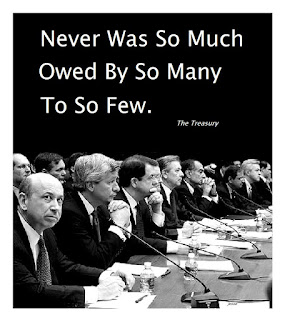Spitzer: If they shut me up, who'll take my place?
Lawsky: I will
The NY Banking regulators clearly do not understand the regulatory 'hands off' philosophy of Treasury and the Fed towards the pampered princes of finance and the privileged few.
This was supposed to have been privately settled amongst gentlemen with a gentle wristslap and a thorough coverup.
And of course this exposes the Federal government and their financerati as utter hypocrites, especially when they are stoking the fires of conflict.
Only the little people are meant to suffer for their country. For the favored few, everything is just another law-bending, money making opportunity.
Some of the wording in this is priceless, especially considering the extent of what the Bank had done and with whom.
I won't be holding my breath for the US regulators to clean up their own manipulated markets and privileged insiders. It might muss someone's ruffled sleeves and Presidential cufflinks.
Liberty and justice -- for some.
Reuters
Exclusive: Regulators irate at NY action against StanChart
By Carrick Mollenkamp and Emily Flitter and Karen Freifeld
August 8, 2012
NEW YORK/LONDON (Reuters) - The Treasury Department and Federal Reserve were blindsided and angered by New York's banking regulator's decision to launch an explosive attack on Standard Chartered Plc over $250 billion in alleged money laundering transactions tied to Iran, sources familiar with the situation said.
By going it alone through the order he issued on Monday, Benjamin Lawsky, head of the recently created New York State Department of Financial Services, also complicates talks between the Treasury and London-based Standard Chartered to settle claims over the transactions, several of the sources said.
Lawsky's stunning move, which included releasing embarrassing communications and details of the bank's alleged defiance of U.S. sanctions against Iran, is rewriting the playbook on how foreign banks settle cases involving the processing of shadowy funds tied to sanctioned countries.
In the past, such cases have usually been settled through negotiation - with public shaming kept to a minimum.
In his order, Lawsky said Standard Chartered's dealings exposed the U.S. banking system to terrorists, drug traffickers and corrupt states.
But the upset expressed by some federal officials, who were given virtually no notice of the New York move, may provide ammunition for Standard Chartered to portray the allegations as coming from a relatively new and over-zealous regulator...
Read the rest here.







































